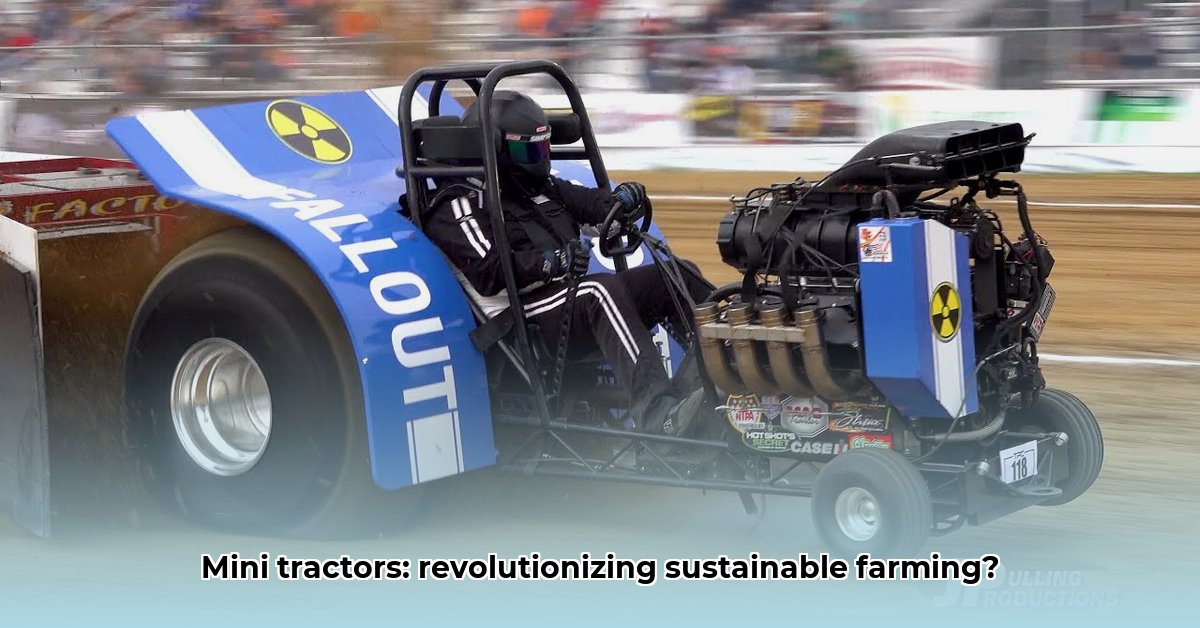
Mini Rod Tractor Pulls: Where Backyard Fun Meets Farming's Future
Forget your grandpa's rusty old tractor; mini rod tractor pulls are a different beast altogether! These aren't your average farm vehicles; they're souped-up, highly modified machines, built for one purpose: to pull the heaviest weight possible. Think of it as the NASCAR of the agricultural world, only smaller and (perhaps) a little less destructive. The roar of the engines, the smell of high-octane fuel, the intense competition – it’s an electrifying spectacle. But beyond the thrills and the spectacle, a surprising connection is brewing between these tiny tractor titans and the future of sustainable farming. For upcoming events near you, check out this event schedule.
More Than Just a Show: The Heart of the Competition
Mini rod tractor pulls aren't merely about brute force; they represent a masterful blend of engineering prowess and operator skill. Competitors dedicate countless hours meticulously crafting their machines. Every nut, bolt, and wire is scrutinized, tweaked, and often replaced with something more powerful or efficient. It’s a testament to human ingenuity, a constant push to improve and overcome limitations. They are constantly experimenting, pushing the boundaries of what these small machines can achieve. This relentless drive for perfection, this dedication to squeezing every last ounce of performance, echoes the challenges and innovations within sustainable agriculture practices.
These aren't just weekend hobbyists; they’re dedicated individuals who invest countless hours and resources perfecting their machines. They are engineers, mechanics, and drivers all rolled into one. They're constantly learning, adapting, and improving their designs, sharing tips and tricks with fellow enthusiasts. This collaborative spirit is a key element in the entire mini rod tractor pulling community. This collaborative spirit and continuous learning directly mirrors the work ethic and innovation needed to advance sustainability efforts within the agricultural industry. Isn't it fascinating how a seemingly niche hobby reflects the larger principles of progress and innovation?
Unexpected Parallels: From Pulls to Sustainable Farming
At first glance, the connection between a high-octane hobby and sustainable farming may seem tenuous. However, a closer look reveals intriguing parallels. The modifications made to these competition tractors often focus on enhancing fuel efficiency and power output. These are precisely the kinds of improvements that could revolutionize actual farm machinery, making them more environmentally friendly and cost-effective. How can we leverage this innovative spirit to reshape the future of farming?
The precision needed to win a pull – the meticulous attention to detail, the fine-tuning of every component – translates directly to the need for precision agriculture. Precision agriculture techniques, like GPS-guided planting and targeted pesticide application, are essential for minimizing waste and maximizing yields while reducing environmental impacts. These techniques reduce reliance on large inputs of water, fertilizer, and pesticides. The quest for efficiency in these miniature tractor competitions mirrors the efforts to optimize resource usage in modern farming.
Community Spirit: A Foundation for Change
Mini rod tractor pulls often serve as community events, drawing people from across the region and beyond. These events aren't just about the competition; they're social gatherings, celebrations of rural heritage, and opportunities to strengthen bonds within the community. This creates a sense of shared identity and mutual support. Strengthening these rural communities is essential for fostering a sustainable future within the agricultural industry. A strong community is better equipped to adopt and implement sustainable practices collectively.
It's a space where farmers, mechanics, engineers, and enthusiasts come together, sharing knowledge and expertise. This constant exchange of information and experience is crucial for driving innovation within both the hobby and the future of sustainable agriculture. How can we replicate this spirit of collaboration on a larger scale to accelerate the adoption of sustainable farming practices?
Precision Farming: A Glimpse into the Future
Precision farming uses advanced technologies to optimize resource usage. Imagine GPS-guided tractors that plant seeds with pinpoint accuracy, reducing waste and maximizing yields. Picture sensor-based irrigation systems that monitor soil moisture and only water when and where it's needed, conserving precious water resources. Drone imagery can help farmers assess crop health and identify problem areas, allowing for targeted interventions and reduced pesticide use.
| Technology | Benefits | Potential Challenges |
|---|---|---|
| GPS-guided machinery | Increased accuracy, reduced overlap and fuel consumption | High initial investment, technological expertise required |
| Sensor-based irrigation | Optimized water usage, reduced water waste | Sensor maintenance, data management complexity |
| Drone imagery & analysis | Precise crop monitoring, targeted interventions | Data security and privacy concerns, regulatory hurdles |
| Variable rate fertilizer application | Optimized nutrient delivery, reduced fertilizer waste | Precise soil mapping needed, calibration complexities |
These technologies, while advanced, share a common thread with mini rod tractor pulls: a relentless pursuit of precision and efficiency. They're both about optimizing resources and maximizing output, albeit on vastly different scales.
The Future is Now: Evolving the Pull
The world of mini rod tractor pulls is constantly evolving. As technology advances, so too will the modifications and techniques employed by competitors. We might see the adoption of biofuels or other cleaner energy sources, leading to more sustainable competition. Future events may even incorporate sustainability criteria into their judging, rewarding innovations that minimize environmental impact.
The indirect yet meaningful parallels between mini rod tractor pulls and the pursuit of sustainable agriculture are striking. Both demonstrate ingenuity, precision engineering, and a commitment to the efficient use of resources. The competitive spirit of these tiny tractor events might just be the unexpected catalyst for significant advancements in sustainable farming practices. The future of both the hobby and sustainable agriculture seems bright, promising increased efficiency and a more harmonious relationship between human activity and nature.